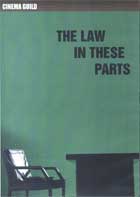
The Law in These Parts 2012
Distributed by Cinema Guild, 115 West 30th Street, Suite 800, New York, NY 10001; 212-685-6242
Produced by the Rabinovich Foundation
Directed by Ra’anan Alexandrowicz
DVD, color, 101 min.
Sr. High - General Adult
Law, Middle Eastern Studies, Political Science
Date Entered: 01/11/2013
Reviewed by Michael J. Coffta, Business Librarian, Bloomsburg University of PennsylvaniaThe Law in These Parts presents tremendous, unique content in a format like no other. A selection of former members of the Israeli military legal corps are interviewed, with extremely pointed questions. Several of these judges and generals developed the laws in the Gaza Strip and the West Bank after the 1967 invasion and subsequent Israeli occupation.
The style and overall structure of this work is extremely inventive. The interviews are conducted at a desk with a huge green screen backdrop. As the interviewee, such as a former military judge is resides in this chair, he is presented with inflammatory (often condemning) footage in this same green screen backdrop. The interviewee’s reaction is witnessed, then the interview continues. To sum up, as succinctly stated in the film itself, “This film is not about the people who broke the law, but about those entrusted with the law.”
These officials spearheaded the creation of hundreds of laws and orders specially created for the occupied territories, and no essential congruence with those applying to Israeli citizens. The persistent question throughout these interviews is, “In retrospect, do you think it was the right move?” The interviews, and accompanying footage, examine prosecutions of outright combatants, those who aided infiltration, and seizure of properties. Despite the seemingly discomforting setting and format of these interviews, the subjects are forthright, and show a great deal of resolve with often compelling arguments. In so doing, they grapple with and exposit terms such as “rule of law,” “exposition of the law,” and discuss Subtle differences in implication based on definitions of terms, such as “held” and “occupied.”
Through the optic of the law, this work explores this unprecedented situation of protracted occupation without bona fide integration into the nation of Israel. While some of the content deals with legal situations particular to the initial occupation, the film regularly reinforces that many of these laws and orders imposed in 1967 are still in place today. It is difficult to conceive of a more potent, relevant work with such a unique assemblage of interviewees, and a creative yet surgical approach.
Awards
- Documentary Grand Jury Prize winner, Sundance Film Festival